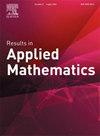基于深度卷积字典学习的三维地震去噪
IF 1.4
Q2 MATHEMATICS, APPLIED
引用次数: 0
摘要
字典学习(DL)已被广泛用于地震数据去噪。然而,它也面临以下挑战。首先,从一个数据集学习字典不能应用于另一个数据集,并且需要设置学习和去噪参数,这不是自适应的。其次,基于稀疏约束的 DL 方法为系数添加了稀疏正则化项,而地震数据只有许多系数接近零,可以近似为稀疏。为了克服这些挑战,我们提出了一种使用深度卷积字典学习(DCDL)的地震数据去噪方法,该方法整合了 DL 的解释能力和深度神经网络的鲁棒学习能力。所提出的方法用从训练数据集学习到的系数前置替换了稀疏前置,系统为每个地震数据点学习自适应字典,以保持数据结构。实验中的合成数据和野外数据表明,我们的方法能有效抑制随机噪声,并保持地震数据事件。本文章由计算机程序翻译,如有差异,请以英文原文为准。
Three-dimensional seismic denoising based on deep convolutional dictionary learning
Dictionary learning (DL) has been widely used for seismic data denoising. However, it is associated with the following challenges. First, learning a dictionary from one dataset cannot be applied to another dataset and requires setting learning and denoising parameters, which is not adaptive. Second, the DL method based on sparse constraints adds sparse regularization terms to the coefficients, while seismic data only has many coefficients close to zero, which can be approximated as sparse. To overcome these challenges, we propose a seismic data denoising approach using deep convolutional dictionary learning(DCDL) that integrates the explanatory power of DL with the robust learning capacity of deep neural networks. The proposed approach replaces sparse priors with coefficient priors learned from the training dataset and system learns adaptive dictionaries for each seismic datapoint to maintain the data structure. Synthetic and field data in the experiment demonstrate that our method effectively suppresses random noise and maintains seismic data events.
求助全文
通过发布文献求助,成功后即可免费获取论文全文。
去求助
来源期刊

Results in Applied Mathematics
Mathematics-Applied Mathematics
CiteScore
3.20
自引率
10.00%
发文量
50
审稿时长
23 days
 求助内容:
求助内容: 应助结果提醒方式:
应助结果提醒方式:


